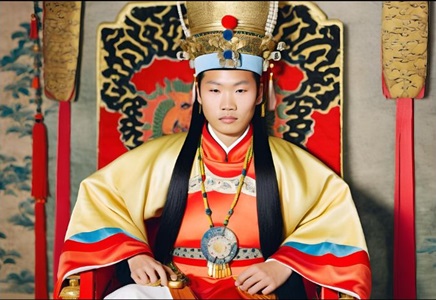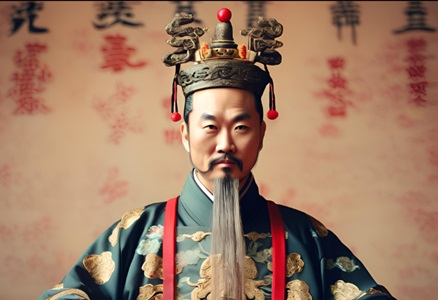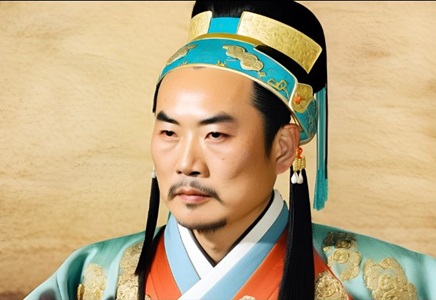Title of Biography in Chinese, Pinyin: 妲己传 (Dá jǐ Zhuàn).
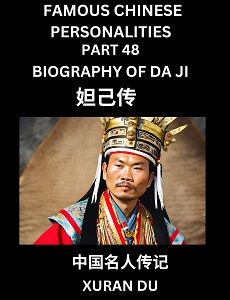
Title of Biography in English: The Biography of Da Ji.
Check out books on my Amazon and Barnes & Noble homepages as well as the following pages to learn Biographies of famous Chinese personalities-
- Part 1 – Chinese Biography Book Series for Beginners
- Part 2 – Chinese Biography Book Series for Beginners
- Part 3 – Chinese Biography Book Series for Beginners
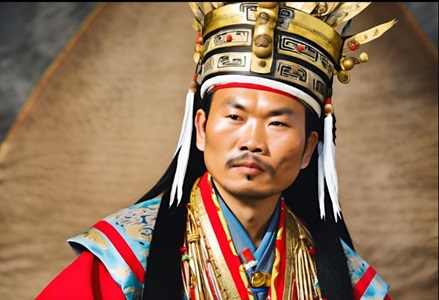
The Biography of Da Ji in English (英文传记)
Da Ji – A Notable Figure of the Shang Dynasty

Daji, also known as Su Daji, was a prominent female figure from the late Shang dynasty, renowned for her beauty and influence. Her life story is shrouded in legend and various historical records, but most sources depict her as the favorite concubine of King Zhou, who had a profound impact on the decline and fall of the Shang dynasty.
According to historical accounts, Daji was originally a woman from the Su tribe. Due to her exceptional beauty, she was chosen by King Zhou and brought into the palace. She was intelligent and perceptive, quickly gaining the king’s favor. However, her influence gradually expanded, and she began to interfere in imperial government affairs, even significantly impacting King Zhou’s decisions.
Under Daji’s influence, King Zhou became more tyrannical and extravagant, ignoring the suffering of the common people. She encouraged him to build luxurious palaces and gardens, consuming vast amounts of manpower and resources. At the same time, she used her beauty and influence to lure King Zhou away from wise ministers and toward unworthy ones, accelerating the corruption and darkness of the imperial government.
As internal conflicts within the Shang dynasty intensified and external forces invaded, the dynasty’s rule gradually faltered. Ultimately, under the leadership of King Wu of Zhou, the Zhou army invaded the Shang capital, leading to King Zhou’s suicide by self-immolation and the end of the Shang dynasty. Daji was also killed after the fall of the Shang dynasty, ending her legendary life.

While Daji’s evaluation in history is mixed, her beauty and influence undoubtedly had a profound impact on the Shang dynasty. Her story has been passed down through the ages, making her one of the famous legendary figures in Chinese history.
Learn Biography Of Da Ji in Chinese (中文传记)
妲己,又称苏妲己,是商朝末期的一位著名女性人物,以其美貌和影响力闻名于世。关于妲己的生平,历史上存在着多种传说和记载,但多数文献都将其描述为商纣王的宠妃,对商朝的衰亡有着深远的影响。

据史书记载,妲己原本是苏氏部落的女子,因其容貌出众,被商纣王看中并带入宫中。她聪明伶俐,善于察言观色,很快就赢得了纣王的宠爱。然而,她的影响力逐渐扩大,开始干涉朝政,甚至对纣王的决策产生重大影响。
在妲己的影响下,纣王变得更加残暴和奢侈,对百姓的疾苦视而不见。她鼓励纣王修建豪华的宫殿和园林,耗费大量的人力和物力。同时,她还利用自己的美貌和影响力,引诱纣王疏远贤臣,亲近小人,加剧了朝政的腐败和黑暗。
随着商朝内部矛盾的加剧和外部势力的入侵,商朝的统治逐渐动摇。最终,在周武王的领导下,周军攻入商都,纣王自焚身亡,商朝灭亡。妲己也在商朝灭亡后被杀,结束了她传奇的一生。
尽管妲己在历史上的评价褒贬不一,但她的美貌和影响力无疑给商朝带来了深远的影响。她的故事也被后人传颂至今,成为了中国历史上著名的传奇人物之一。
Da Ji Biography Keywords- English, Chinese & Pinyin (关键词)

- 妲己 (Dá jǐ), Da Ji: The famous concubine of King Zhou of the Shang dynasty, noted for her beauty and influence.
- 苏妲己 (Sū dájǐ) – Su Da Ji: Another name for Daji, indicating her origin from the Su tribe.
- 商纣王 (Shāng zhòu wáng)- King Zhou of Shang: The king of the Shang dynasty who favored Daji and was influenced by her.
- 宠妃 (Chǒng fēi) – Favorite concubine: A term referring to a woman favored and loved by a king or emperor.
- 朝政 (Cháozhèng) – Imperial government: The administration and politics of a country or dynasty.
Pinyin of Da Ji Biography (妲己传记的拼音)

Dájǐ, yòu chēng sū dájǐ, shì shāng cháo mòqí de yī wèi zhùmíng nǚxìng rénwù, yǐ qí měimào hé yǐngxiǎng lì wénmíng yú shì. Guānyú dájǐ de shēngpíng, lìshǐ shàng cúnzàizhe duō zhǒng chuánshuō he jìzǎi, dàn duōshù wénxiàn dōu jiāng qí miáoshù wèi shāng zhòu wáng de chǒng fēi, duì shāng cháo de shuāiwáng yǒuzhe shēnyuǎn de yǐngxiǎng.
Jù shǐshū jìzǎi, dájǐ yuánběn shì sū shì bùluò de nǚzǐ, yīn qí róngmào chūzhòng, bèi shāng zhòu wáng kàn zhòng bìng dài rù gōng zhōng. Tā cōngmíng línglì, shànyú cháyánguānsè, hěn kuài jiù yíngdéle zhòu wáng de chǒng’ài. Rán’ér, tā de yǐngxiǎng lì zhújiàn kuòdà, kāishǐ gānshè cháozhèng, shènzhì duì zhòu wáng de juécè chǎnshēng zhòngdà yǐngxiǎng.
Zài dájǐ de yǐngxiǎng xià, zhòu wáng biàn dé gèngjiā cánbào hé shēchǐ, duì bǎixìng de jíkǔ shì’érbùjiàn. Tā gǔlì zhòu wáng xiūjiàn háohuá de gōngdiàn hé yuánlín, hàofèi dàliàng de rénlì hé wùlì. Tóngshí, tā hái lìyòng zìjǐ dì měimào hé yǐngxiǎng lì, yǐnyòu zhòu wáng shūyuǎn xián chén, qīnjìn xiǎo rén, jiājùle cháozhèng de fǔbài hé hēi’àn.
Suízhe shāng cháo nèibù máodùn de jiājù hé wàibù shìlì de rùqīn, shāng cháo de tǒngzhì zhújiàn dòngyáo. Zuìzhōng, zài zhōu wǔwáng de lǐngdǎo xià, zhōu jūn gōng rù shāngdū, zhòu wáng zìfén shēnwáng, shāng cháo mièwáng. Dájǐ yě zài shāng cháo mièwáng hòu bèi shā, jiéshùle tā chuánqí de yīshēng.

Jǐnguǎn dájǐ zài lìshǐ shàng de píngjià bāobiǎn bù yī, dàn tā dì měimào hé yǐngxiǎng lì wúyí gěi shāng cháo dài láile shēnyuǎn de yǐngxiǎng. Tā de gùshì yě bèi hòu rén chuánsòng zhìjīn, chéngwéile zhōngguó lìshǐ shàng zhùmíng de chuánqí rénwù zhī yī.
